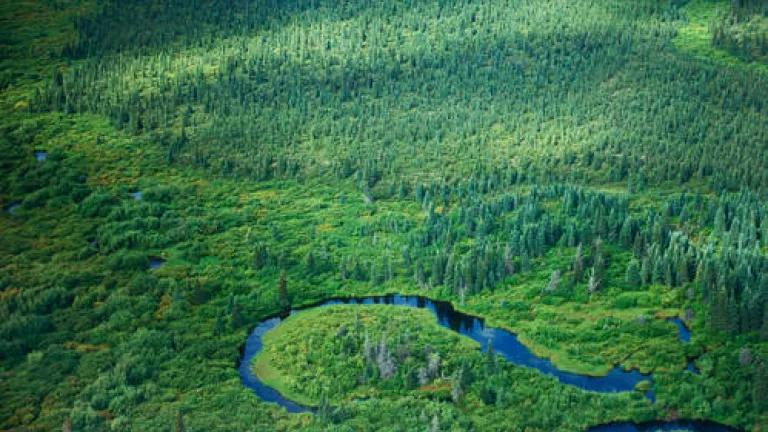
Imagine if a massive open-pit mine were carved into the pristine ecosystem that supported your livelihood and your region’s economy. Or if were built in a way that threatened the cultural traditions that your family has honored for generations.
It’s an alarming prospect, and that’s why so many communities in Bristol Bay, Alaska oppose the Pebble Mine.
This enormous gold and copper operation would produce an estimated 10 billion tons of contaminated waste and require earthen dams—some taller than the Three Gorges Dam in China—to hold back that waste forever. All of this would be done at the headwaters of a wild salmon run that supports a $1.5 billion annual commercial fishery and employs 14,000 people.
This week the Environmental Protection Agency is holding public meetings in the Bristol Bay communities of Dillingham and Iliamna as part of its review of the project. I am pleased that EPA Administrator Gina McCarthy will be attending the meetings and hearing firsthand from the Alaska Natives, residents, and commercial fishermen whose lives and livelihoods are threatened by Pebble Mine.
NRDC will also speak at the public meeting in Dillingham and our message is unequivocal: The unspoiled watershed that feeds the world’s largest wild salmon fishery and supports subsistence-based Native communities is no place for large-scale mining like the proposed Pebble Mine.
The EPA has been studying the effects of large-scale mining in Bristol Bay for more than two years. At the request of nine federally recognized tribes and others, the agency conducted a scientific assessment of the potential impacts on the Bristol Bay watershed. The agency’s findings—which have already undergone extensive public comment and scientific peer review—were re-released last April for additional public comment and peer review.
The assessment paints a stark picture for Bristol Bay. The watershed would face certain dewatering, destruction, and pollution from large-scale mining. Mining would risk not only the salmon and the commercial and sports fishing industries, but also the people and wildlife who depend on salmon to survive.
Even in a best-case scenario — operating at the highest industry standards and experiencing no leaks or failures (which is impossible) — Pebble Mine would destroy up to 90 miles of stream, eliminate up to 4,800 acres of wetlands, and drain an additional 34 miles of stream.
Even under routine operations, the construction and support of the mine would require a huge amount of infrastructure across land currently untouched by humans: from culverts and pipelines to power plants and tailings dams.
Worse, the agency concluded that a tailings dam failure could be "catastrophically damaging."
It's no wonder that 85 percent of commercial fishermen in Bristol Bay, 81 percent of the Bristol Bay Native Corporation's native shareholders and 80 percent of Bristol Bay residents oppose Pebble Mine. They are the ones who will bear the greatest burden if anything goes wrong at the mine—just like the fishermen and residents I met in the Gulf of Mexico who suffered on the frontlines of the BP Deepwater Horizon disaster.
They have the most to lose, and they deserve to be heard now, before it’s too late. That is why I commend the EPA for listening to local voices and for responding to the request from tribes, residents, commercial fishing interests, business owners, churches, sportsmen’s groups, chefs and restaurant owners, jewelers, investors, and conservation organizations who asked the EPA to use its authority under the Clean Water Act to stop the Pebble Mine.
Administrator McCarthy deserves our thanks for working to protect the Bristol Bay watershed and the communities, salmon, and wildlife that depend on it for survival. Now, as the people of Bristol Bay will tell her loud and clear, the EPA must take the next step, finalize its assessment, and initiate action under the Clean Water Act to stop the Pebble Mine.
Photo credit: Robert Glenn Ketchum
